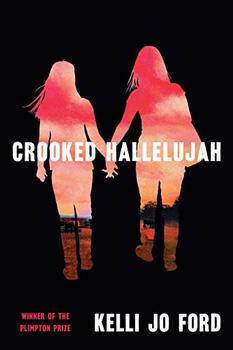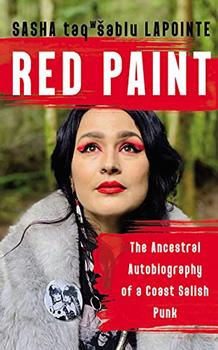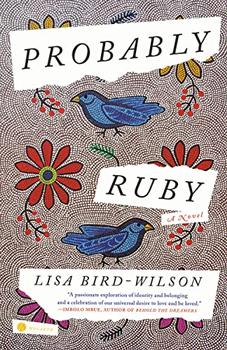Summary | Excerpt | Reviews | Beyond the book | Read-Alikes | Genres & Themes | Author Bio

Kelli Jo Ford's debut work is a novel in stories following four generations of women who are all affected to varying degrees by the fundamentalist teachings of the Beulah Springs Holiness Church, which serves believers on Cherokee Nation land in Oklahoma. The first story opens in 1974 on Lula and her 15-year-old daughter, Justine. Justine is attempting to tell her mother that she has been in touch with her previously estranged father, who left without warning years earlier. While she knows Lula will consider it a betrayal, she wants to see her father and the world outside the Holiness religion, which to her at the moment means the Six Flags amusement park in Texas. In the meantime, she is unaware that she is pregnant, having been date raped by an older man she saw secretly some weeks earlier. The emotionally charged atmosphere surrounding this significant time in Justine's life and the impending judgment she faces from her family and community sets this compelling story and the rest of the book in motion.
Normally, in a work of fiction that shows a sympathetic female protagonist experiencing the threat of persecution from a fundamentalist religious sect, the horror and unfairness of conservative and paternalistic attitudes might form the focal point. However, while these attitudes certainly exist in Crooked Hallelujah, Justine herself and her bond with Lula are of primary importance. As Justine attempts to run away from home to escape her family's disappointment, making her way through the woods and arriving, unintentionally, back at the Holiness church, where a "powerful force" keeps her lingering outside as the congregation gathers and her mother looks for her in the surrounding area, her inner world and her observations of the sights around her come intensely alive:
After everyone else had gone inside, Lula stood before the open church doorway, scanning the field before her, as if that weren't the last place Justine would go if she had run away. Except here she was, and unbeknownst to Lula, the only earthly things between them were the fireflies beginning to flash before a row of oak trees and one lone shagbark hickory.
As Justine finds her way back to her mother despite her feelings of resentment and alienation, it becomes clear that both Lula's faith and her relationship with her daughter are deeply rooted and complex. This remains apparent throughout the book, which to a certain extent continues along the chronological progression of Lula and Justine's lives — as well as those of Lula's mother and the child to whom Justine gives birth, Reney — but also weaves back and forth through various time periods, points of view and locations. As it does so, it continues to employ simple but arresting imagery that highlights the quiet mysteries of domestic existence, as in a description of eight-year-old Reney's tumultuous living situation with her mother:
A good-time crew from the factory drifts in and out of the house. Cigarette butts transform ashtrays into morning-after volcanoes. Reney turns the ash-dusted tabletops into canvases, tracing hearts in her path when she creeps to the kitchen in the morning quiet.
It feels noteworthy to see a contemporary novel that fully and ambitiously embraces the nuanced role that religion can play in people's lives. Spirituality has often come across in fiction as something inescapable and all-encompassing, as in the work of Flannery O'Connor, to name one oft-cited example of acceptably canonical faith-based literature, or as a simple menace to society. Ford's novel, however, more in the realm of James Baldwin's Go Tell It On the Mountain, depicts the serious function religion takes on within a close-knit community. While Crooked Hallelujah is arguably more concerned with the community itself than the Holiness church, it situates spirituality within the context of its four protagonists' daily lives, questioning how various types of faith might enable action or inaction, notably for people who struggle to change their lives but find themselves unable to cope without the familiar mechanisms — such as dead-end jobs and relationships — that trap them.
Though Crooked Hallelujah opens with radiant confidence and pushes through to a generous and satisfying ending, it suffers in between from a common pitfall of the novel-in-stories format: It sometimes adheres to a strong narrative arc, but at other times wanders too far from its central concerns. A story appearing towards the middle of the book features a character only loosely connected to the four main women, and this feels like an interruption to the flow of the overarching plot.
Despite this, all the various parts of the novel are infused with a similar urgent mood that suggests the inner arrangement of a person's self has a crucial effect on the external world around them. Ford offers readers a memorable glimpse of her characters' lives, making the journey through their stories abundantly worthwhile.
![]() This review was originally published in The BookBrowse Review in July 2020, and has been updated for the
August 2021 edition.
Click here to go to this issue.
This review was originally published in The BookBrowse Review in July 2020, and has been updated for the
August 2021 edition.
Click here to go to this issue.

If you liked Crooked Hallelujah, try these:

by Sasha taqʷšəblu LaPointe
Published 2023
An Indigenous artist blends the aesthetics of punk rock with the traditional spiritual practices of the women in her lineage in this bold, contemporary journey to reclaim her heritage and unleash her power and voice while searching for a permanent home.

by Lisa Bird-Wilson
Published 2023
An Indigenous woman adopted by white parents goes in search of her identity in this unforgettable debut novel about family, race, and history.
Your guide toexceptional books
BookBrowse seeks out and recommends the best in contemporary fiction and nonfiction—books that not only engage and entertain but also deepen our understanding of ourselves and the world around us.